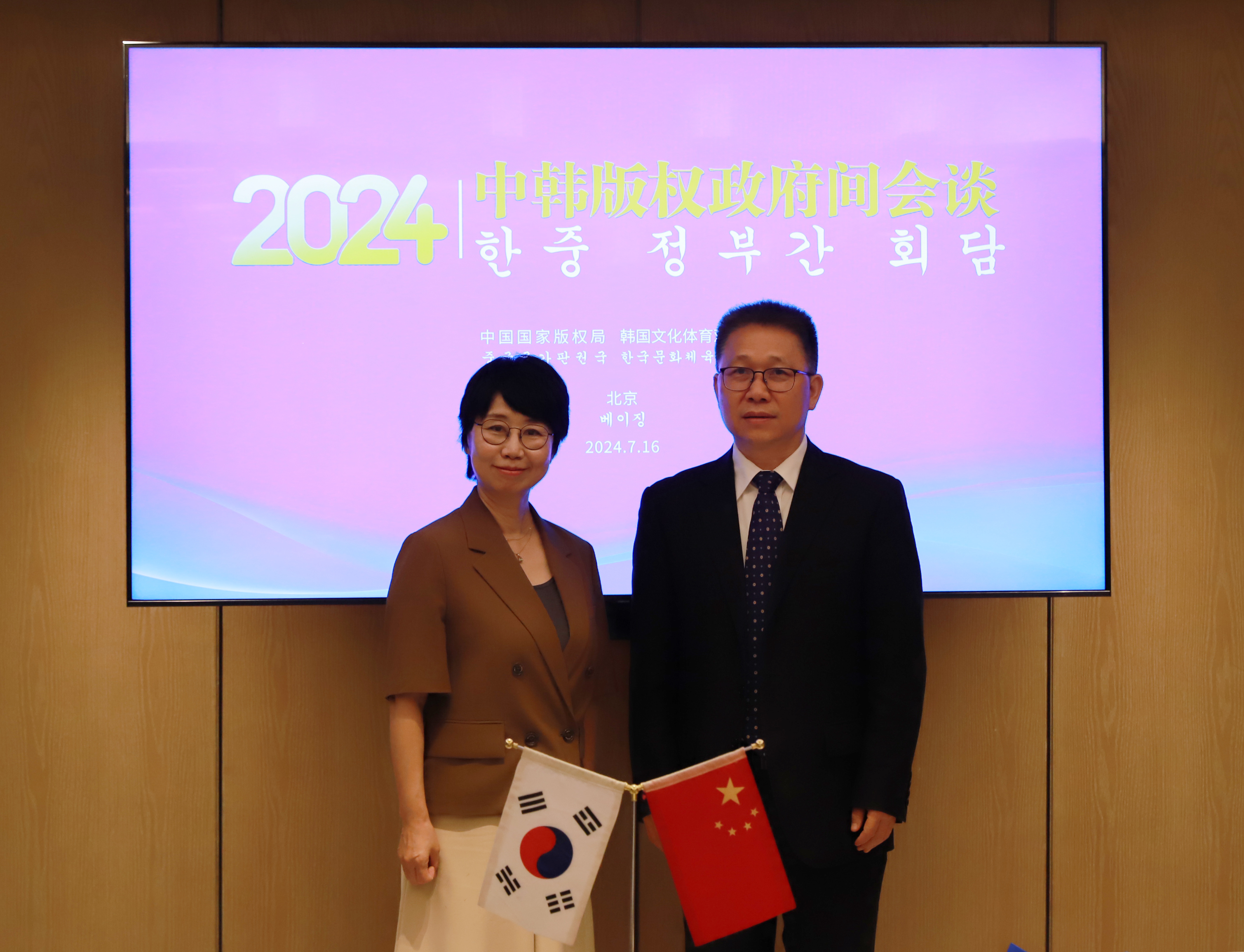Korea and China Seek Joint Solutions for AI Copyright Issues
2024 Korea-China Intergovernmental Copyright Meeting and Forum Held in Beijing on July 16

The Ministry of Culture Sports and Tourism (MCST) (Minister Yoo In-chon) announced that it held the 2024 Korea-China Intergovernmental Copyright Meeting and Forum with Chinas National Copyright Administration on July 16 in Beijing. The event aimed to strengthen cooperation between the two countries on copyright policies in the AI environment and the development of the music industry.
Since signing a Memorandum of Understanding on copyright exchange and cooperation in 2006 the MCST and Chinas National Copyright Administration have continued to hold annual Korea-China copyright exchange events for over 15 years. This year building on the mutual respect and pursuit of common interests emphasized at the Korea-China summit in May the two nations agreed to further solidify their public-private copyright cooperation network to foster a healthy copyright ecosystem.
Governments Focus on AI-Related Copyright Issues and Fair Compensation for Record Producers
On the morning of July 16 the 16th Korea-China Director-General Level Intergovernmental Copyright Meeting (with Chinas lead representative Director Wang Zhi-cheng of the Copyright Administration) addressed four main topics: copyright legislation trends responses to copyright infringement copyright collective management and other cooperative tasks. The first session focused on the latest efforts by both governments to address various copyright issues triggered by generative AI. The Chinese side praised the proactive efforts of the Korean government on AI and copyright issues and noted that it would take more time for China to release an official policy. Both countries agreed to continue close cooperation in responding to technological advancements like generative AI and to lead international standards on AI copyright.
The meeting also delved into mutual cooperation in combating copyright infringement. Korea shared follow-up measures from the K-Content Illegal Distribution Eradication Plan jointly announced by government departments in July last year under President Yoon Suk-yeols directive. China explained its ongoing crackdowns led by the National Copyright Administration on illegal distribution of works including K-content. Korea expressed gratitude for Chinas efforts and emphasized the need for continued proactive responses and joint investigations.
A key focus of this meeting was the new compensation system for record producers that China is introducing. The 2020 revision of Chinas Copyright Law included a provision for record producers right to remuneration for the online transmission of recorded music. China is currently drafting detailed regulations for implementation and expressed interest in learning from Koreas relevant systems and experiences. Korea provided an overview of its compensation management system and promised to share technical and detailed information to help China establish an efficient and advanced compensation system for record producers.
The two nations also agreed to celebrate the 20th anniversary of copyright exchange and cooperation in 2025 by building a more future-oriented and progressive framework for collaboration. They will actively consider signing a revised MOU on copyright exchange and cooperation next year to reflect the evolving copyright environment and policy needs.
Expanding Legal Distribution of K-Content through Private Sector Exchange in the Music Field
A separate private exchange meeting attended by music industry representatives from both countries was also held. Organizations such as the Korea Music Copyright Association the Korea Music Authors Association the Music Copyright Society of China and the China Audio-Visual Copyright Collective Management Association along with companies like Cube Entertainment Genie Music Tencent Music and NetEase Music discussed IP-centric collaboration and business models fostering cooperation among individual companies. The Korea Entertainment Producers Association responsible for collecting compensation for recordings explored establishing a communication system with the China Audio-Visual Copyright Collective Management Association and local collection strategies. MCST plans to continue supporting the expansion of private cooperation networks to promote the legal distribution of K-content in China.
Discussing Cooperation Strategies for the Music Industry in the AI Era at the Korea-China Copyright Forum
The 18th Korea-China Copyright Forum held after the intergovernmental meeting and private exchange featured discussions among government academic and music industry representatives on the theme Copyright Policies and the Music Industry in the Digital Era. They reviewed the latest trends and issues and discussed ways to strengthen cooperation.
In the first session Kim Chan-dong head of the Legislative Research Team at the Korea Copyright Commission and Zhang Qingkun secretary of the Internet Copyright Industry Research Base at the China Copyright Administration presented on AI and Copyright Recent Policies and Industry Trends enhancing mutual understanding of the two countries responses to AI-related copyright issues.
The second session focused on AI and the Music Industry with Professor Choi Seung-jae from Sejong Universitys School of Law discussing Issues and Challenges Posed by Generative AI in the Music Industry highlighting various perspectives on human-AI collaboration. Professor Zheng Ning from Communication University of China presented on Building a Digital Music Copyright Ecosystem with AI analyzing AIs positive impact on the music industry and introducing Chinas response cases such as the Interim Measures for the Management of Generative AI Services.
The third session explored ways to strengthen cooperation between the two countries music copyright collective management organizations. Lee Tae-jin Director of International Legal Affairs at the Korea Music Authors Association and Liu Ping Vice President and Secretary-General of the Music Copyright Society of China presented strategies and visions for enhancing collaboration between their respective organizations.
Jeong Hyang-mi Director of the Copyright Bureau at MCST stated Following the Korea-China summit in May which was held after four years we expect increased exchange and cooperation between Korea and China. This event further strengthened the cooperation network between our two countries in the copyright field. She added We have initiated discussions on compensation rights for record producers. We will continue to share our systems and engage in ongoing discussions through intergovernmental meetings to expand the foundation for properly protecting copyright holders rights in both Korea and China.
Website: : http://www.wip-news.com/news/articleView.html?idxno=24300
